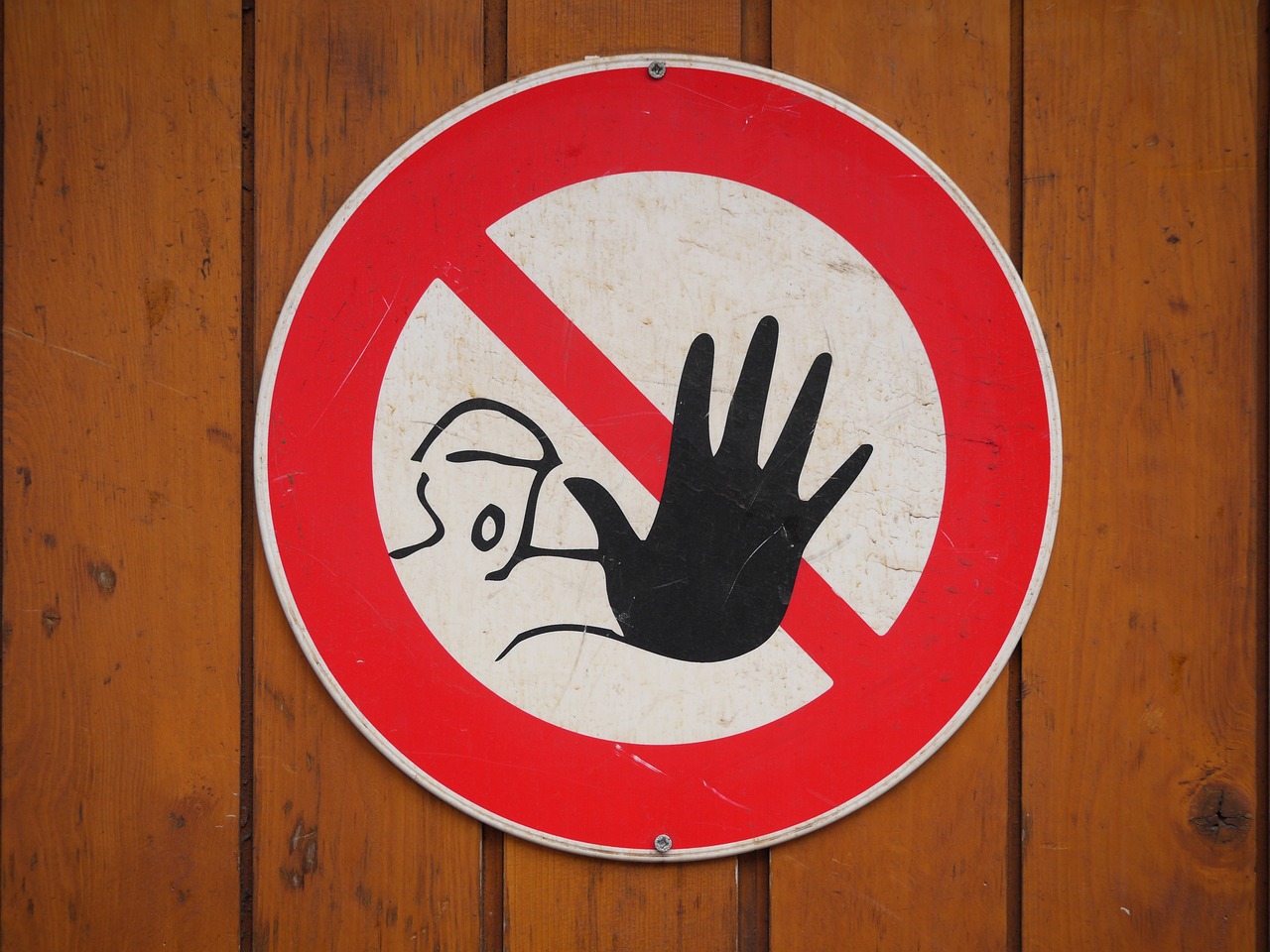Extortion in Online Relationships - Safety Tips
In today's digital age, where connections are just a click away, the rise of online relationships has brought about a new set of challenges. One of the most alarming issues is extortion, which can occur when trust is exploited in these virtual spaces. This article dives deep into the murky waters of online extortion, aiming to equip you with the knowledge and tools necessary to protect yourself in this evolving landscape. Whether you’re navigating a budding romance or simply connecting with new friends online, understanding the risks and how to mitigate them is crucial.
Online extortion is a form of coercion where individuals are threatened with the release of personal information, photos, or videos unless certain demands are met. This form of manipulation can happen to anyone, regardless of age or background. Recognizing the signs of online extortion is key to preventing it from affecting you. The first step is to be aware of the tactics used by extortionists and how they prey on vulnerabilities.
Extortionists are often skilled manipulators who use various tactics to gain control over their victims. Familiarizing yourself with these strategies can help you spot red flags early on. They often employ manipulation, deception, and emotional pressure to coerce individuals into compliance.
One of the most insidious tactics is emotional manipulation. Extortionists often create a facade of intimacy, making you feel as though you have formed a genuine connection. They exploit your vulnerabilities, often using your fears and insecurities against you. Understanding this tactic can empower you to resist coercive pressures and maintain control over your personal information.
Extortionists typically build trust over time, slowly weaving themselves into your life. They may share personal stories, create a sense of camaraderie, and even engage in romantic conversations. Recognizing the difference between a genuine relationship and a manipulative interaction is vital for your safety. Always remember, if something feels off, it probably is.
Another common strategy involves fabricating stories to provoke sympathy. These false narratives can be incredibly convincing, designed to elicit your compassion and compliance. Being aware of these tactics can help you maintain a healthy level of skepticism and protect yourself from falling victim to their schemes.
Financial exploitation is another significant risk in online relationships. Extortionists may target victims by asking for money under various pretenses, such as medical emergencies or travel expenses. Understanding how these criminals operate can help you steer clear of potential scams. Always ask yourself: would I lend money to someone I’ve never met in person?
Identifying warning signs is crucial in preventing online extortion. Being aware of these red flags can help you stay safe in your digital interactions. Here are some key indicators to watch out for:
If you notice inconsistent stories or discrepancies in the information shared by someone online, it could be a sign of deceit. Trust your instincts and pay attention to the details; they often reveal more than words alone.
Another significant red flag is if someone pressures you to share sensitive information. This could be anything from your home address to financial details. Maintaining clear boundaries is essential to avoid potential extortion situations. Remember, it's perfectly okay to say no.
Taking proactive measures can significantly reduce your risk of falling victim to online extortion. Here are some essential steps that can enhance your safety in digital relationships:
Creating strong, unique passwords for your online accounts is fundamental in protecting your personal information. Avoid using easily guessable passwords and consider using a password manager to keep track of them.
Be cautious about sharing personal details online. Always evaluate the necessity of sharing information before doing so. The less you share, the less you have to lose.
If you find yourself a victim of online extortion, knowing how to respond is vital. Here are important steps to take immediately:
Keeping a record of all communications is essential. Documentation can provide evidence if legal action is necessary. This includes saving messages, screenshots, and any other relevant information that may be useful in addressing your case effectively.
Reporting extortion attempts to law enforcement can help protect you and others from becoming victims. Authorities can investigate and take appropriate actions against perpetrators. Remember, you are not alone, and seeking help is a sign of strength.
Q: How can I tell if someone is trying to extort me online?
A: Look for signs such as inconsistent stories, pressure to share personal information, or requests for money. Trust your instincts; if something feels wrong, it’s worth investigating further.
Q: What should I do if I receive a threatening message?
A: Do not respond to the message. Document everything and report it to the authorities. It's important to take threats seriously and seek help.
Q: Can I prevent online extortion?
A: Yes! By being cautious about the information you share, using strong passwords, and recognizing red flags, you can significantly reduce your risk of becoming a victim.

Understanding Online Extortion
Online extortion is a sinister and increasingly prevalent issue in the digital age, where the anonymity of the internet can embolden malicious actors. At its core, online extortion involves a perpetrator threatening to disclose sensitive personal information, such as private images or messages, unless specific demands—often financial—are met. This form of coercion can happen in various contexts, from dating apps to social media platforms, and it often leaves victims feeling vulnerable and isolated.
Recognizing the signs of online extortion is crucial for prevention and response. Many individuals may not realize they are being targeted until it’s too late. Some common indicators include:
- Unexpected Requests: If someone you just met online suddenly asks for personal information or intimate images, it's a major red flag.
- Pressure Tactics: Extortionists often use emotional manipulation, making victims feel guilty or responsible for the situation.
- Threats of Disclosure: The most alarming sign is when the individual threatens to share your private information with friends, family, or the public.
Understanding the psychology behind online extortion can empower individuals to protect themselves. Extortionists prey on feelings of trust and affection, often establishing a false sense of intimacy to exploit their victims. They may present themselves as someone who genuinely cares, only to turn the relationship into a weapon against the victim when they least expect it.
It's essential to maintain a healthy skepticism when engaging in online relationships. Always ask yourself: Is this person being genuine, or are they trying to manipulate my emotions? By staying vigilant and recognizing the signs of online extortion, individuals can better navigate the murky waters of digital relationships and safeguard their personal information.
What should I do if I suspect I am being extorted online?
If you suspect you are being extorted, do not engage further with the extortionist. Document all communications and consider reporting the incident to the appropriate authorities.
Can I prevent online extortion?
Yes, by practicing caution when sharing personal information and recognizing red flags, you can significantly reduce your risk of falling victim to online extortion.
Is it safe to report extortion to the police?
Yes, reporting extortion is crucial. Law enforcement can provide guidance and may be able to take action against the perpetrator, helping to protect you and others.

Common Tactics Used by Extortionists
When it comes to online relationships, the tactics used by extortionists can be both cunning and manipulative. These individuals often rely on a mix of emotional pressure, deception, and psychological manipulation to exploit their victims. Understanding these tactics is not just important; it's essential for anyone engaging in online interactions. By familiarizing yourself with how extortionists operate, you can better protect yourself and spot potential threats before they escalate.
One of the primary strategies employed by extortionists is emotional manipulation. They often try to create a false sense of intimacy, making their targets feel special or understood. This can involve sharing personal stories that resonate with the victim's own experiences, thereby building a connection that feels genuine. However, this is merely a façade designed to lower your guard. For example, an extortionist might share a sob story about their financial struggles or emotional turmoil to evoke sympathy. This emotional appeal can cloud your judgment, making it easier for them to gain your trust and, ultimately, exploit your vulnerabilities.
Another common tactic is the creation of false narratives. Extortionists are skilled storytellers who can weave elaborate tales that tug at your heartstrings. They may fabricate stories about their lives, claiming to be in dire situations that require immediate financial assistance or personal information. This tactic plays on your emotions, pushing you to act quickly without fully considering the implications. Recognizing these fabricated narratives is crucial; always maintain a healthy level of skepticism when someone shares an overly dramatic or inconsistent story.
Financial exploitation is also a significant concern in online relationships. Extortionists often target individuals with the intent of extracting money. They may ask for funds under the guise of needing help for an emergency, or they may threaten to leak sensitive information unless a ransom is paid. This tactic is particularly alarming because it can lead to severe financial loss and emotional distress for the victim. Understanding how these predators operate can help you avoid falling victim to their schemes.
To summarize, here are some common tactics used by extortionists:
- Emotional Manipulation: Building false intimacy to gain trust.
- False Narratives: Fabricating stories to elicit sympathy and compliance.
- Financial Exploitation: Targeting individuals for monetary gain through threats or deceit.
By being aware of these tactics, you can significantly reduce your risk of becoming a victim. Remember, if something feels off or too good to be true, it probably is. Always trust your instincts and prioritize your safety in online interactions.
Q1: What should I do if I suspect someone is trying to extort me online?
A1: If you suspect extortion, document all interactions and avoid engaging further. Consider reporting the individual to the platform and local authorities.
Q2: How can I protect my personal information online?
A2: Use strong, unique passwords, enable two-factor authentication, and be cautious about the information you share on social media and other platforms.
Q3: Are there any signs that might indicate someone is an extortionist?
A3: Look out for inconsistencies in their stories, pressure to share personal information, and requests for money or sensitive data. Trust your gut feelings.

Emotional Manipulation
Emotional manipulation is a devious tactic that many extortionists employ to gain trust and exploit the vulnerabilities of their victims. It often begins subtly, with the manipulator weaving a web of emotional connection that can feel genuine at first glance. This can be likened to a spider spinning its silk, creating a trap that appears inviting but is ultimately dangerous. For instance, an extortionist may share personal stories or express vulnerabilities to create a bond, making you feel as though you are in a safe space. This false sense of intimacy can cloud your judgment, leading you to lower your defenses.
One of the key strategies in emotional manipulation is the use of guilt and sympathy. Extortionists are adept at playing the victim card, often sharing fabricated stories of hardship or distress to elicit your empathy. They may say things like, "If you really cared about me, you'd help me out," which puts pressure on you to comply with their demands. This type of emotional blackmail can be incredibly effective, as it preys on your natural desire to support and protect others.
To help you recognize emotional manipulation, here are some common signs to watch out for:
- Excessive Flattery: If someone is showering you with compliments too soon, it may be a tactic to lower your guard.
- Victim Mentality: Be wary of those who constantly portray themselves as victims, as this can be a way to gain your sympathy and support.
- Isolation Attempts: Manipulators may try to isolate you from friends or family to gain more control over your emotions and decisions.
Understanding these tactics can empower you to resist coercive pressures. It’s essential to maintain a level of skepticism in your online interactions, especially when someone seems overly eager to connect or share personal details. Remember, a genuine relationship is built on mutual respect and trust, not on emotional coercion. By being aware of the signs of emotional manipulation, you can protect yourself from falling into the traps set by extortionists.
- What should I do if I suspect emotional manipulation? If you feel uncomfortable or pressured in any online relationship, it’s crucial to take a step back. Trust your instincts and consider discussing your feelings with a trusted friend or family member.
- How can I differentiate between genuine concern and manipulation? Genuine relationships are characterized by mutual support and respect. If someone is consistently making you feel guilty or pressured, it’s a sign of manipulation.
- Can emotional manipulation happen in face-to-face interactions? Absolutely. While this article focuses on online relationships, emotional manipulation can occur in any context where one person seeks to control or exploit another.

Building Trust
This article explores the rising issue of extortion in online relationships, offering valuable insights into how individuals can protect themselves and navigate these potentially dangerous situations effectively.
Online extortion involves threatening to reveal personal information or images unless demands are met. Recognizing the signs is crucial for prevention and response.
Extortionists often employ manipulation, deception, and emotional pressure. Familiarizing yourself with these tactics can help you identify red flags and safeguard your personal information.
Emotional manipulation is a common strategy used to gain trust and exploit vulnerabilities. Understanding this tactic can empower individuals to resist coercive pressures.
Building trust is a critical component in any relationship, especially in the online realm where anonymity can mask true intentions. Extortionists are particularly skilled at creating a facade of trustworthiness to lure victims into their traps. They often begin by establishing an emotional connection, sharing personal stories, and presenting themselves as relatable individuals. This approach can be incredibly effective, as it plays on our innate desire for connection and understanding.
To better illustrate how trust is built in these scenarios, consider the following elements:
- Shared Experiences: Extortionists may share fabricated stories that resonate with the victim's own experiences, creating a false sense of camaraderie.
- Flattery: Compliments and excessive praise can be used to lower defenses, making individuals more susceptible to manipulation.
- Gradual Disclosure: By slowly revealing personal information, they create an illusion of vulnerability, which can prompt the victim to reciprocate.
Recognizing the difference between genuine relationships and manipulative interactions is vital for your safety. If someone seems too eager to share personal details or pushes for deeper connections too quickly, it’s essential to pause and evaluate the situation. Ask yourself: Are they genuinely interested in me, or is this a tactic to gain my trust? Trust should be built over time through consistent behavior and mutual respect, not through rushed intimacy or emotional pressure.
Identifying warning signs can prevent individuals from becoming victims of online extortion. Awareness of these red flags is essential for maintaining safety in online interactions.
Inconsistent stories can signal deceit. Paying attention to discrepancies in information shared can help you determine the trustworthiness of an online acquaintance.
If someone pressures you to share sensitive information, it's a significant red flag. Maintaining boundaries is crucial to avoiding potential extortion situations.
Implementing proactive measures can significantly reduce the risk of online extortion. Here are essential steps to enhance your safety in digital relationships.
Creating strong, unique passwords for online accounts is fundamental in protecting personal information from potential extortionists.
Being cautious about sharing personal details online can help safeguard against extortion. Always evaluate the necessity of sharing information before doing so.
If you find yourself a victim of online extortion, knowing how to respond is vital. Here are important steps to take immediately.
Keeping a record of all communications can provide evidence if legal action is necessary. Documentation is crucial in addressing extortion cases effectively.
Reporting extortion attempts to law enforcement can help protect you and others. Authorities can investigate and take appropriate actions against perpetrators.
Q: What should I do if someone threatens to share my personal information?
A: Stay calm and do not comply with their demands. Document all communications and report the incident to the authorities.
Q: How can I tell if someone is trying to manipulate me online?
A: Look for signs of emotional manipulation, such as excessive flattery, pressure to share personal information, or inconsistent stories.
Q: Is it safe to share personal information with someone I met online?
A: Be cautious. Always evaluate the necessity of sharing personal details and consider the potential risks involved.
Q: Can I recover from online extortion?
A: Yes, by documenting everything and reporting to authorities, you can take steps to protect yourself and seek justice.

Creating False Narratives
This article explores the rising issue of extortion in online relationships, offering valuable insights into how individuals can protect themselves and navigate these potentially dangerous situations effectively.
Online extortion involves threatening to reveal personal information or images unless demands are met. Recognizing the signs is crucial for prevention and response.
Extortionists often employ manipulation, deception, and emotional pressure. Familiarizing yourself with these tactics can help you identify red flags and safeguard your personal information.
Emotional manipulation is a common strategy used to gain trust and exploit vulnerabilities. Understanding this tactic can empower individuals to resist coercive pressures.
Extortionists often build trust by creating intimate connections. Recognizing the difference between genuine relationships and manipulative interactions is vital for your safety.
In the world of online relationships, is a tactic that extortionists frequently rely on to manipulate their victims. They craft elaborate stories designed to elicit sympathy or provoke a sense of obligation. These narratives can take many forms, from tragic personal tales to fabricated incidents that require immediate financial assistance. For instance, an extortionist might claim they are in a dire situation, such as facing a medical emergency or dealing with a family crisis, and that they need money to resolve these issues. This emotional ploy is intended to bypass your rational thinking, pushing you to act out of compassion rather than caution.
Recognizing these false narratives can be challenging, especially when they are presented with convincing detail. Here are some common characteristics of these fabricated stories:
- Overly Dramatic Elements: The stories often contain exaggerated emotions or implausible situations that seem too intense to be real.
- Urgent Requests: They typically demand immediate action, creating a sense of panic that can cloud your judgment.
- Inconsistencies: As you dig deeper, you may notice discrepancies in the story that raise questions about its authenticity.
It's essential to maintain a healthy skepticism when interacting with individuals online. Always ask yourself: does this story seem plausible? Have they provided evidence or details that can be verified? If something feels off, it probably is. By questioning these narratives, you can protect yourself from falling victim to their manipulative tactics.
Identifying warning signs can prevent individuals from becoming victims of online extortion. Awareness of these red flags is essential for maintaining safety in online interactions.
Inconsistent stories can signal deceit. Paying attention to discrepancies in information shared can help you determine the trustworthiness of an online acquaintance.
If someone pressures you to share sensitive information, it's a significant red flag. Maintaining boundaries is crucial to avoiding potential extortion situations.
Implementing proactive measures can significantly reduce the risk of online extortion. Here are essential steps to enhance your safety in digital relationships.
Creating strong, unique passwords for online accounts is fundamental in protecting personal information from potential extortionists.
Being cautious about sharing personal details online can help safeguard against extortion. Always evaluate the necessity of sharing information before doing so.
If you find yourself a victim of online extortion, knowing how to respond is vital. Here are important steps to take immediately.
Keeping a record of all communications can provide evidence if legal action is necessary. Documentation is crucial in addressing extortion cases effectively.
Reporting extortion attempts to law enforcement can help protect you and others. Authorities can investigate and take appropriate actions against perpetrators.
Q: What should I do if someone threatens to share my personal information online?
A: Document all interactions, do not comply with their demands, and report the situation to the authorities. Protect your personal information and consider adjusting your privacy settings on social media.
Q: How can I identify if someone is trying to manipulate me emotionally?
A: Look for signs of inconsistency in their stories, pressure to act quickly, or attempts to create a false sense of urgency. Trust your instincts—if something feels wrong, it probably is.
Q: Are there any preventative measures I can take to avoid online extortion?
A: Yes! Use strong, unique passwords, limit the amount of personal information you share online, and be cautious about who you engage with in online relationships.

Financial Exploitation
This article explores the rising issue of extortion in online relationships, offering valuable insights into how individuals can protect themselves and navigate these potentially dangerous situations effectively.
Online extortion involves threatening to reveal personal information or images unless demands are met. Recognizing the signs is crucial for prevention and response.
Extortionists often employ manipulation, deception, and emotional pressure. Familiarizing yourself with these tactics can help you identify red flags and safeguard your personal information.
Emotional manipulation is a common strategy used to gain trust and exploit vulnerabilities. Understanding this tactic can empower individuals to resist coercive pressures.
Extortionists often build trust by creating intimate connections. Recognizing the difference between genuine relationships and manipulative interactions is vital for your safety.
Many extortionists fabricate stories to provoke sympathy and compliance. Awareness of these false narratives can help individuals maintain skepticism and protect themselves.
Financial exploitation is a significant risk in online relationships. Extortionists are often skilled at identifying individuals who may be vulnerable due to emotional distress or financial instability. They may use various tactics to manipulate their victims into sending money or sharing financial information. For instance, they might present themselves as someone in dire need, claiming that they require funds for emergencies or medical expenses.
It's essential to understand the methods that extortionists use to exploit financial situations:
- Creating a Sense of Urgency: They may pressure you to act quickly, suggesting that time is of the essence. This tactic can cloud your judgment and lead to hasty decisions.
- Using Fake Profiles: Many extortionists create fake identities to gain your trust. They may use attractive photos and crafted backstories to appear more credible.
- Offering Financial Incentives: Some may promise returns on investments or quick financial gains to lure you into a trap.
Recognizing these tactics can help individuals remain vigilant and avoid falling prey to such scams. By maintaining a healthy skepticism and verifying any claims made, you can protect your finances and personal information from potential exploitation.
Identifying warning signs can prevent individuals from becoming victims of online extortion. Awareness of these red flags is essential for maintaining safety in online interactions.
Inconsistent stories can signal deceit. Paying attention to discrepancies in information shared can help you determine the trustworthiness of an online acquaintance.
If someone pressures you to share sensitive information, it's a significant red flag. Maintaining boundaries is crucial to avoiding potential extortion situations.
Implementing proactive measures can significantly reduce the risk of online extortion. Here are essential steps to enhance your safety in digital relationships.
Creating strong, unique passwords for online accounts is fundamental in protecting personal information from potential extortionists.
Being cautious about sharing personal details online can help safeguard against extortion. Always evaluate the necessity of sharing information before doing so.
If you find yourself a victim of online extortion, knowing how to respond is vital. Here are important steps to take immediately.
Keeping a record of all communications can provide evidence if legal action is necessary. Documentation is crucial in addressing extortion cases effectively.
Reporting extortion attempts to law enforcement can help protect you and others. Authorities can investigate and take appropriate actions against perpetrators.
Q: What should I do if I receive a threatening message online?
A: Do not respond to the message. Document it and report it to the platform and local authorities.
Q: How can I protect my personal information online?
A: Use strong passwords, enable two-factor authentication, and be cautious about sharing personal details.
Q: Is it safe to meet someone from an online relationship in person?
A: Always exercise caution. Meet in public places and inform someone you trust about your plans.

Recognizing Red Flags
In the vast landscape of online relationships, recognizing red flags is your first line of defense against potential extortion. It's essential to stay vigilant and aware of the signs that something might not be right. Being proactive can make all the difference in ensuring your safety and well-being. One of the most critical aspects to pay attention to is the inconsistency in stories. If the person you're communicating with frequently changes their narrative or provides conflicting information, it could indicate deceit. Trust your instincts; if something feels off, it probably is. Remember, a trustworthy individual should have a consistent and clear story about themselves.
Another significant warning sign is the pressure to share personal information. If someone is pushing you to divulge sensitive details about your life, such as your address, financial information, or even intimate photos, take a step back. This type of pressure is a huge red flag and should never be ignored. Maintaining your boundaries is crucial, and it's okay to say no. In a genuine relationship, both parties should respect each other's privacy without coercion.
Furthermore, be wary of individuals who seem overly eager to establish an emotional connection. While building a bond is a natural part of any relationship, extortionists often rush this process to gain your trust quickly. They might share personal stories or express strong feelings before you even know them well. This tactic is designed to create a false sense of intimacy, making you more susceptible to their manipulative tactics. Trust is built over time, not in a matter of days.
Additionally, take note of how they react when you set boundaries. If they become defensive, angry, or try to guilt-trip you, these are clear indicators that their intentions may not be pure. Healthy relationships thrive on mutual respect and understanding, so any sign of manipulation should raise alarms. Remember, it's not just about what they say; it's also about how they make you feel.
In summary, recognizing these red flags can significantly reduce your risk of falling victim to online extortion. Always trust your gut feelings, and don’t hesitate to distance yourself from anyone who exhibits suspicious behavior. The key is to remain cautious and informed, ensuring that your online interactions are safe and secure.
- What should I do if I notice red flags in an online relationship?
If you notice any red flags, it's essential to reassess the relationship. Trust your instincts and consider cutting off communication if you feel uncomfortable. - Can I report suspicious behavior?
Yes, you can report any suspicious behavior to the platform you are using or to local law enforcement if you feel threatened. - How can I enhance my online safety?
Use strong passwords, limit personal information sharing, and always be cautious about who you engage with online.

Inconsistent Stories
This article explores the rising issue of extortion in online relationships, offering valuable insights into how individuals can protect themselves and navigate these potentially dangerous situations effectively.
Online extortion involves threatening to reveal personal information or images unless demands are met. Recognizing the signs is crucial for prevention and response.
Extortionists often employ manipulation, deception, and emotional pressure. Familiarizing yourself with these tactics can help you identify red flags and safeguard your personal information.
Emotional manipulation is a common strategy used to gain trust and exploit vulnerabilities. Understanding this tactic can empower individuals to resist coercive pressures.
Extortionists often build trust by creating intimate connections. Recognizing the difference between genuine relationships and manipulative interactions is vital for your safety.
Many extortionists fabricate stories to provoke sympathy and compliance. Awareness of these false narratives can help individuals maintain skepticism and protect themselves.
Financial exploitation is a significant risk in online relationships. Understanding how extortionists target victims financially can help individuals avoid falling prey to scams.
Identifying warning signs can prevent individuals from becoming victims of online extortion. Awareness of these red flags is essential for maintaining safety in online interactions.
In the world of online relationships, can act as a flashing red light, signaling deceit and manipulation. When someone tells you a story that seems to change over time, it’s essential to take a step back and assess the situation critically. For instance, if a person claims to have a certain job but later mentions a different position or company, this inconsistency could indicate that they are not being truthful. Are they trying to impress you or perhaps cover up something more sinister?
Moreover, inconsistencies can manifest in various ways, such as:
- Changing details about their background or experiences.
- Contradictory information about their interests or hobbies.
- Varying accounts of how they met you or what they initially said.
By paying close attention to these discrepancies, you can better gauge the trustworthiness of your online acquaintances. Remember, just like in a detective novel, the truth often reveals itself when you piece together the clues. If someone’s story doesn’t add up, it’s a significant red flag that warrants caution. Trust your instincts; if something feels off, it probably is.
Implementing proactive measures can significantly reduce the risk of online extortion. Here are essential steps to enhance your safety in digital relationships.
Creating strong, unique passwords for online accounts is fundamental in protecting personal information from potential extortionists.
Being cautious about sharing personal details online can help safeguard against extortion. Always evaluate the necessity of sharing information before doing so.
If you find yourself a victim of online extortion, knowing how to respond is vital. Here are important steps to take immediately.
Keeping a record of all communications can provide evidence if legal action is necessary. Documentation is crucial in addressing extortion cases effectively.
Reporting extortion attempts to law enforcement can help protect you and others. Authorities can investigate and take appropriate actions against perpetrators.
- What should I do if someone threatens to expose my private information?
Immediately document all communications and consider reporting the threat to the authorities. - How can I identify if someone is trying to manipulate me online?
Look for inconsistencies in their stories and any pressure to share personal information. - Is it safe to share personal information with someone I met online?
Always be cautious and evaluate whether sharing that information is necessary and safe.

Pressure to Share Personal Information
In the digital age, where personal connections often flourish online, it's easy to forget that not everyone has good intentions. One of the most alarming tactics employed by extortionists is the . This pressure can manifest in various forms, and recognizing it is crucial for your safety. Think about it: how many times have you felt uncomfortable when someone you've just met online asked for details about your life that seemed unnecessary? It's a classic red flag, and it’s essential to trust your instincts in these situations.
Extortionists often employ a range of emotional tactics to coerce individuals into divulging sensitive information. They might start with seemingly innocent questions, gradually escalating their requests until you feel obligated to comply. This can include asking for personal photos, financial details, or even your home address. The key here is to maintain your boundaries and to remember that you are under no obligation to share anything you are not comfortable with.
To illustrate the different kinds of pressure you might encounter, consider the following scenarios:
- Urgency: They may create a false sense of urgency, insisting that they need the information right away for some fabricated reason.
- Emotional Appeals: They might express feelings of distress or vulnerability, playing on your sympathies to make you feel guilty for not sharing.
- Manipulation: Some may claim that sharing personal information is a sign of trust and that withholding it could jeopardize your budding relationship.
It's vital to remain skeptical and to ask yourself: Is this information really necessary for our relationship? If the answer is no, then it’s a clear indication that you should hold back. Remember, a genuine connection should not thrive on secrets or pressure; it should be built on mutual respect and understanding. By keeping your personal information private, you not only protect yourself but also set a standard for how you expect to be treated in any relationship.
In summary, the pressure to share personal information is a significant warning sign in online interactions. Always prioritize your safety and well-being over the desire to please someone you barely know. By maintaining a cautious approach and being aware of these tactics, you can navigate the online landscape more safely.
Q: What should I do if someone pressures me for personal information online?
A: Trust your instincts. If you feel uncomfortable, it's perfectly fine to refuse to share that information. You can also report the individual to the platform you’re using.
Q: How can I tell if someone is trying to manipulate me emotionally?
A: Look for signs of inconsistency in their stories, excessive flattery, or attempts to create a sense of urgency. If their behavior feels off, it probably is.
Q: Is it safe to share some personal information online?
A: While sharing some information can be safe, it’s crucial to evaluate what you’re sharing and with whom. Always err on the side of caution.

Steps to Protect Yourself
In a world where online interactions are becoming increasingly common, taking proactive steps to protect yourself from potential extortion is more important than ever. The digital landscape can be a tricky place, filled with both genuine connections and deceptive individuals. By implementing a few essential safety measures, you can significantly reduce your risk of falling victim to online extortion.
First and foremost, using strong passwords is a fundamental practice in safeguarding your online accounts. Think of your password as the key to your digital home; the stronger it is, the harder it is for intruders to gain access. A good password should be a mix of letters, numbers, and special characters, and it should avoid easily guessable information like birthdays or names. For added security, consider using a password manager to keep track of your various passwords and ensure that each one is unique.
Another critical step is to limit the sharing of personal information online. While it’s natural to want to connect and share with others, always evaluate the necessity of sharing specific details. Ask yourself questions like: "Do I really need to share my phone number?" or "Is posting my address worth it?" By keeping personal information under wraps, you can create a barrier that protects you from potential extortionists looking to exploit your vulnerabilities.
Moreover, be cautious about the platforms you use for online interactions. Some social media sites and dating apps have privacy settings that allow you to control who sees your information. Take the time to familiarize yourself with these settings and adjust them to enhance your privacy. Also, consider using two-factor authentication wherever possible. This adds an extra layer of security by requiring a second form of verification, making it much harder for someone to access your accounts even if they manage to get your password.
Finally, trust your instincts. If something feels off about an online interaction, it probably is. It’s essential to recognize your comfort level and set boundaries that protect your emotional and physical safety. If someone is pressuring you to share personal details or making you feel uncomfortable, don’t hesitate to distance yourself from that relationship. Remember, it’s always better to be safe than sorry.
Here are some common questions people have regarding online extortion and how to protect themselves:
- What should I do if I receive an extortion message?
If you receive an extortion message, do not respond to the sender. Instead, document the message and report it to the appropriate authorities.
- Can I prevent online extortion completely?
While you may not be able to eliminate all risks, following safety measures can significantly reduce your chances of becoming a victim.
- How can I recognize a scammer?
Be wary of individuals who pressure you for personal information, share inconsistent stories, or create a sense of urgency in their communications.

Use Strong Passwords
This article explores the rising issue of extortion in online relationships, offering valuable insights into how individuals can protect themselves and navigate these potentially dangerous situations effectively.
Online extortion involves threatening to reveal personal information or images unless demands are met. Recognizing the signs is crucial for prevention and response.
Extortionists often employ manipulation, deception, and emotional pressure. Familiarizing yourself with these tactics can help you identify red flags and safeguard your personal information.
Emotional manipulation is a common strategy used to gain trust and exploit vulnerabilities. Understanding this tactic can empower individuals to resist coercive pressures.
Extortionists often build trust by creating intimate connections. Recognizing the difference between genuine relationships and manipulative interactions is vital for your safety.
Many extortionists fabricate stories to provoke sympathy and compliance. Awareness of these false narratives can help individuals maintain skepticism and protect themselves.
Financial exploitation is a significant risk in online relationships. Understanding how extortionists target victims financially can help individuals avoid falling prey to scams.
Identifying warning signs can prevent individuals from becoming victims of online extortion. Awareness of these red flags is essential for maintaining safety in online interactions.
Inconsistent stories can signal deceit. Paying attention to discrepancies in information shared can help you determine the trustworthiness of an online acquaintance.
If someone pressures you to share sensitive information, it's a significant red flag. Maintaining boundaries is crucial to avoiding potential extortion situations.
Implementing proactive measures can significantly reduce the risk of online extortion. Here are essential steps to enhance your safety in digital relationships.
Creating strong, unique passwords for your online accounts is fundamental in protecting your personal information from potential extortionists. Think of your password as the lock on your front door; if it's weak, you're inviting trouble. A strong password should include a mix of uppercase and lowercase letters, numbers, and special characters. For example, instead of using a simple password like "password123," consider a more complex one like "P@ssw0rd!2023." This not only makes it harder for hackers to guess but also adds an extra layer of security.
To help you understand the importance of strong passwords, here’s a quick comparison:
| Password Example | Strength Level | Notes |
|---|---|---|
| password | Weak | Commonly used, easily guessable |
| 123456 | Weak | Sequential numbers are predictable |
| P@ssw0rd!2023 | Strong | Combination of letters, numbers, and symbols |
| G!veM3$ecUr1ty | Very Strong | Unique and complex, hard to crack |
Additionally, consider using a password manager to help generate and store your passwords securely. This way, you won’t have to remember every single password, and you can ensure that each one is strong and unique. Remember, keeping your accounts secure is a crucial step in avoiding online extortion.
If you find yourself a victim of online extortion, knowing how to respond is vital. Here are important steps to take immediately.
Keeping a record of all communications can provide evidence if legal action is necessary. Documentation is crucial in addressing extortion cases effectively.
Reporting extortion attempts to law enforcement can help protect you and others. Authorities can investigate and take appropriate actions against perpetrators.
- What should I do if I receive an extortion message?
Do not respond to the message. Document it and report it to the authorities immediately.
- Can I prevent online extortion?
Yes, by using strong passwords, being cautious about sharing personal information, and recognizing red flags, you can significantly reduce your risk.
- Is it safe to share personal information online?
It's important to be cautious. Always evaluate the necessity of sharing personal details and maintain boundaries.

Limit Sharing Personal Information
This article explores the rising issue of extortion in online relationships, offering valuable insights into how individuals can protect themselves and navigate these potentially dangerous situations effectively.
Online extortion involves threatening to reveal personal information or images unless demands are met. Recognizing the signs is crucial for prevention and response.
Extortionists often employ manipulation, deception, and emotional pressure. Familiarizing yourself with these tactics can help you identify red flags and safeguard your personal information.
Emotional manipulation is a common strategy used to gain trust and exploit vulnerabilities. Understanding this tactic can empower individuals to resist coercive pressures.
Extortionists often build trust by creating intimate connections. Recognizing the difference between genuine relationships and manipulative interactions is vital for your safety.
Many extortionists fabricate stories to provoke sympathy and compliance. Awareness of these false narratives can help individuals maintain skepticism and protect themselves.
Financial exploitation is a significant risk in online relationships. Understanding how extortionists target victims financially can help individuals avoid falling prey to scams.
Identifying warning signs can prevent individuals from becoming victims of online extortion. Awareness of these red flags is essential for maintaining safety in online interactions.
Inconsistent stories can signal deceit. Paying attention to discrepancies in information shared can help you determine the trustworthiness of an online acquaintance.
If someone pressures you to share sensitive information, it's a significant red flag. Maintaining boundaries is crucial to avoiding potential extortion situations.
In today's digital world, being cautious about the information you share online is more important than ever. The internet can feel like a vast playground, but it is also a jungle where predators lurk. Limiting the personal information you share can significantly reduce your risk of falling victim to extortion. Think of your personal data as a treasure; you wouldn't want just anyone to have access to it, right?
When engaging with individuals online, consider the following:
- Evaluate Necessity: Always ask yourself if sharing certain details is necessary. Do you really need to disclose your location, phone number, or personal interests? If not, keep it to yourself.
- Use Privacy Settings: Take advantage of privacy settings on social media platforms to control who can see your information. Make sure only trusted friends have access to your personal details.
- Think Before You Post: Before posting anything online, think about how it could be used against you. A seemingly harmless photo or comment could be twisted in the wrong hands.
Remember, the less information you provide, the harder it is for potential extortionists to manipulate you. It's like locking your doors and windows; it may seem like extra work, but it keeps you safe.
If you find yourself a victim of online extortion, knowing how to respond is vital. Here are important steps to take immediately.
Keeping a record of all communications can provide evidence if legal action is necessary. Documentation is crucial in addressing extortion cases effectively.
Reporting extortion attempts to law enforcement can help protect you and others. Authorities can investigate and take appropriate actions against perpetrators.
Q: What should I do if someone threatens to expose my personal information online?
A: Remain calm and do not engage further. Document all communications and report the threat to the authorities.
Q: How can I tell if someone is trying to manipulate me online?
A: Look for signs of emotional manipulation, such as excessive flattery, pressure to share personal information, or inconsistent stories about their life.
Q: Is it safe to share my social media accounts with someone I met online?
A: Be cautious. Only share your social media accounts with people you trust and have verified. It's better to err on the side of caution.
Q: Can I recover from online extortion?
A: Yes, many people recover from online extortion. Document everything, seek support from friends or professionals, and report the incident to authorities.

What to Do If You Become a Victim
Finding yourself a victim of online extortion can be a terrifying experience. The emotional toll can be overwhelming, and it’s easy to feel isolated. However, the first step to regaining control is to recognize that you are not alone, and there are effective strategies to combat this situation. Here are some crucial actions to take immediately:
Firstly, document everything. This means keeping a detailed record of all communications with the extortionist. Save screenshots of conversations, emails, and any other relevant information. This documentation serves as crucial evidence should you decide to take legal action. It's like building a fortress around your experience; the more information you have, the stronger your case becomes.
Next, consider reporting the incident to the authorities. Many people hesitate to do this, thinking it might not make a difference. However, authorities can investigate and may already have information on the perpetrator. Reporting helps not just you but also protects others who might fall victim to the same extortionist. Think of it as shining a light on the dark corners of the internet where these predators lurk.
Furthermore, it’s essential to inform the platform where the interaction occurred. Whether it’s a social media site, a dating app, or any other online platform, they often have policies and procedures in place to handle such incidents. By reporting the extortionist, you contribute to making the online environment safer for everyone. It’s like being part of a community watch program; your actions can help protect others.
Additionally, consider seeking support from friends or family. Sharing your experience with trusted individuals can provide emotional relief and practical advice. They can offer a fresh perspective and remind you that you’re not alone in this battle. Think of it as gathering your own personal army; together, you can face the challenges ahead.
Lastly, don’t hesitate to seek professional help if the situation impacts your mental health. Therapists and counselors can provide coping strategies to manage anxiety and fear stemming from the extortion experience. Just like you would see a doctor for a physical ailment, your mental health deserves the same attention and care.
In summary, if you find yourself a victim of online extortion, remember to:
- Document all communications.
- Report to law enforcement.
- Inform the platform involved.
- Seek support from friends and family.
- Consider professional help for mental health support.
Taking these steps can empower you to regain control over your situation. Online extortion can feel like a dark cloud hanging over you, but with the right actions, you can find your way back to the light.
Q: What should I do if I receive a threatening message online?
A: Immediately document the message, take screenshots, and avoid responding. Report it to the platform and consider contacting law enforcement.
Q: Can I report extortion attempts anonymously?
A: Yes, many law enforcement agencies allow for anonymous reporting. Check their websites for information on how to proceed.
Q: What if the extortionist has my personal information?
A: If you believe your personal information is compromised, consider taking steps to secure your accounts, such as changing passwords and enabling two-factor authentication.
Q: Is it safe to talk to someone about my experience?
A: Absolutely. Speaking with trusted friends, family, or professionals can provide support and help you process the situation.
Q: How can I prevent becoming a victim in the future?
A: Educate yourself about online safety, recognize red flags, and be cautious about sharing personal information. Always trust your instincts.

Document Everything
This article explores the rising issue of extortion in online relationships, offering valuable insights into how individuals can protect themselves and navigate these potentially dangerous situations effectively.
Online extortion involves threatening to reveal personal information or images unless demands are met. Recognizing the signs is crucial for prevention and response.
Extortionists often employ manipulation, deception, and emotional pressure. Familiarizing yourself with these tactics can help you identify red flags and safeguard your personal information.
Emotional manipulation is a common strategy used to gain trust and exploit vulnerabilities. Understanding this tactic can empower individuals to resist coercive pressures.
Extortionists often build trust by creating intimate connections. Recognizing the difference between genuine relationships and manipulative interactions is vital for your safety.
Many extortionists fabricate stories to provoke sympathy and compliance. Awareness of these false narratives can help individuals maintain skepticism and protect themselves.
Financial exploitation is a significant risk in online relationships. Understanding how extortionists target victims financially can help individuals avoid falling prey to scams.
Identifying warning signs can prevent individuals from becoming victims of online extortion. Awareness of these red flags is essential for maintaining safety in online interactions.
Inconsistent stories can signal deceit. Paying attention to discrepancies in information shared can help you determine the trustworthiness of an online acquaintance.
If someone pressures you to share sensitive information, it's a significant red flag. Maintaining boundaries is crucial to avoiding potential extortion situations.
Implementing proactive measures can significantly reduce the risk of online extortion. Here are essential steps to enhance your safety in digital relationships.
Creating strong, unique passwords for online accounts is fundamental in protecting personal information from potential extortionists.
Being cautious about sharing personal details online can help safeguard against extortion. Always evaluate the necessity of sharing information before doing so.
If you find yourself a victim of online extortion, knowing how to respond is vital. Here are important steps to take immediately.
When faced with online extortion, the first and most critical step is to . This means keeping a meticulous record of all communications, including messages, emails, and social media interactions. Not only does this create a timeline of events, but it also serves as invaluable evidence should you need to involve law enforcement or seek legal action. Here’s what you should focus on:
- Save all messages: Take screenshots or save chat logs to capture the entire conversation. Make sure to include timestamps.
- Record details: Note the dates, times, and platforms where interactions occurred. This information can be crucial for investigators.
- Keep personal information safe: If the extortionist has any of your personal data, ensure you have a record of what was shared, as this can help in assessing the threat level.
By being thorough in your documentation, you can provide law enforcement with the necessary information to take action against the perpetrator. Remember, the more detailed your records, the stronger your case will be.
Reporting extortion attempts to law enforcement can help protect you and others. Authorities can investigate and take appropriate actions against perpetrators.
- What should I do if I receive a threatening message?
- Do not engage with the sender. Document the message and report it to the authorities immediately.
- Can I get my money back if I have been scammed?
- It depends on the circumstances and the payment method used. Report the scam to your bank or payment provider as soon as possible.
- How can I tell if someone is trying to manipulate me online?
- Watch for inconsistencies in their story, excessive flattery, or pressure to share personal information. Trust your instincts.

Report to Authorities
If you find yourself in the unfortunate situation of being a victim of online extortion, it is crucial to take immediate action. Reporting the incident to the authorities is not just a step towards protecting yourself; it is also a way to help prevent others from falling victim to the same perpetrator. Authorities have the resources and expertise to investigate these crimes, and your report could be the key to stopping an extortionist in their tracks.
When reporting, be prepared to provide as much information as possible. This includes:
- Documentation: Keep a detailed record of all communications with the extortionist. This includes emails, messages, screenshots, and any other relevant information that can serve as evidence.
- Personal Information: Be ready to share your personal information, such as your name, address, and contact details, but only if you feel safe doing so.
- Details of the Incident: Provide a clear account of what happened, including dates, times, and the nature of the threats made against you.
Remember, reporting extortion is not just about seeking help for yourself; it’s about contributing to a larger effort to combat online crime. Law enforcement agencies often use reports to identify patterns of behavior, track down repeat offenders, and develop strategies to protect the community. Your courage to report can help create a safer online environment for everyone.
In addition to local law enforcement, consider reporting the incident to online platforms where the extortionist may have contacted you. Many social media sites and online services have policies against harassment and extortion, and they can take action against the perpetrator’s account. This collaborative effort can amplify the impact of your report.
Lastly, it’s essential to remember that you are not alone in this situation. Many organizations and hotlines specialize in supporting victims of online crime. They can offer advice, resources, and emotional support as you navigate this challenging time. Taking action is a powerful way to reclaim your sense of safety and control.
Q: What should I do first if I am being extorted online?
A: The first step is to stop all communication with the extortionist. Document everything and report the incident to the authorities and the platform where the interaction took place.
Q: Will reporting extortion help me?
A: Yes, reporting can help protect you and potentially prevent the extortionist from targeting others. Authorities can investigate and take necessary actions against the perpetrator.
Q: Can I remain anonymous when reporting?
A: Depending on the reporting method, you may have the option to remain anonymous. However, providing your information can help law enforcement in their investigation.
Q: Is it safe to share my experience with others?
A: Sharing your experience can be empowering and may help others recognize similar situations. However, ensure you’re comfortable with what you share and consider privacy implications.
Frequently Asked Questions
-
What is online extortion?
Online extortion is a form of coercion where someone threatens to reveal personal information, images, or other sensitive content unless their demands—often financial—are met. It's a serious issue that can affect anyone engaged in online relationships.
-
How can I recognize the signs of online extortion?
Look out for inconsistent stories and any pressure to share personal information. If someone you met online is pushing you to disclose sensitive details or their narrative seems fishy, it's a major red flag!
-
What should I do if I become a victim of online extortion?
First, document everything. Keep records of all interactions, as this can be vital for any legal action. Then, report the situation to the authorities. They can help investigate and potentially stop the extortionist.
-
How can I protect myself from online extortion?
Using strong, unique passwords for your accounts is essential. Additionally, be cautious about sharing personal information online. Always think twice before disclosing anything that could be used against you.
-
What are some common tactics used by extortionists?
Extortionists often rely on emotional manipulation, creating false narratives to gain trust, and applying pressure to exploit vulnerabilities. Being aware of these tactics can help you identify potential threats in your online interactions.



















